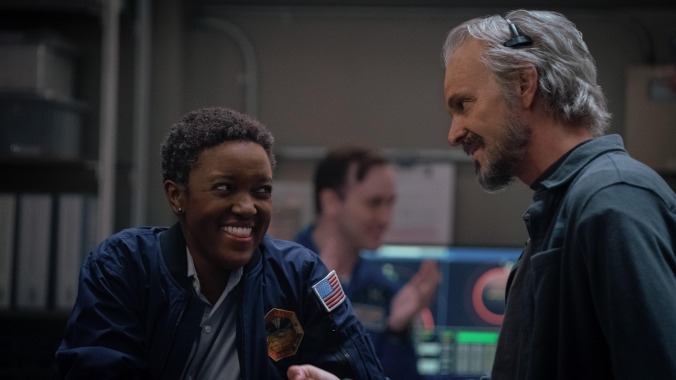For All Mankind season 4 review: One giant, soapy misstep
In the Apple TV+ show's most tedious season yet, Ronald D. Moore's series struggles to balance space thrills and emotional arcs

For All Mankind began as a transfixing space odyssey. Ronald D. Moore’s audacious drama—arguably the best Apple TV+ original when the streaming platform launched in November 2019—immediately stood out with its unique blend of retro-futurism, nostalgia, and sci-fi-driven technological advancements. Set in an alternate history, it turned a colossal topic like the space race between the U.S. and Russia into an agonizing, rousing TV show about humanity’s potential. And despite the larger-than-life subject matter, it remained character-driven at its core. Unfortunately, four years later, this becomes the show’s downfall.
In season four, which premieres November 10, For All Mankind loses its electrifying luster as it jumps to the early aughts. The protagonists, both old and new, are saddled with serious soap opera-level storylines, placing the show’s usual space thrills on the back burner. FAM isn’t able to find the balance between its two main features. There’s no gratifying sense of urgency, adventure, or tension from its interstellar setting, at least not in the seven of 10 episodes screened for critics. It’s especially disappointing because much of the action takes place on Mars, and yet the final result is as dim as a faded star. (The visuals, on the other hand, remain as bright and breathtaking as ever.)
Gone are the days FAM spent time developing its cosmic discoveries. Remember the anxiety of watching astronauts scavenge the lunar surface for ice or trying to escape a solar storm? Or the heartbreak of seeing Gordo (Michael Dorman) and Tracy (Sarah Jones) die on the moon after they used duct tape as a spacesuit to save their compatriots? That level of storytelling has evaporated. Hell, even trying to land an MSAM rover safely would be exciting to witness at this point. The season-four premiere delivers a major space-related event, but after that, the show slowly plunges in quality.
Mars is now nothing but Earth 2.0.—and a bold testament to how humanity will destroy itself, no matter what planetary frontier it conquers. Capitalism and nationalism prevail over scientific accomplishments for the residents of Happy Valley, led by beloved returning favorites Dani Poole (series MVP Krys Marshall) and Ed Baldwin (Joel Kinnaman, sporting an atrocious wig and bad makeup to look older). It’s anything but happy here, though. In the show’s version of 2003, in which it takes roughly only a month to get to the Red Planet safely, private company Helios has sent too many low-level workers to space. They’re treated as underpaid second-class citizens on an expanding base, prompting newcomers like Miles (Servant’s Toby Kebbell) and Samantha (Tyner Rushing) to embark on a quest for equality. A necessary class war has come to Mars, and by the looks of it, it’s here to stay.








































